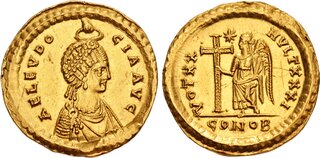| Classical Numismatic Group > Auction 126 | Auction date: 28 May 2024 |
| Lot number: 926 Price realized: This lot is for sale in an upcoming auction - Bid on this lot  | Show similar lots on CoinArchives Find similar lots in upcoming auctions on |
| Lot description: Aelia Eudocia. Augusta, AD 423-460. AV Solidus (21.5mm, 4.32 g, 6h). Constantinople mint, 10th officina. Struck under Theodosius II, AD 423-425. Pearl-diademed and draped bust right, wearing earring and necklace; being crowned by manus Dei above / Victory standing left, holding long cross; star in upper left field; I//CONOB. RIC X 228; Depeyrot 75/2; Biaggi 2334 var. (no officina). Lamination error, minor graffiti, a couple of scrapes, a few marks. Near EF. Rare. From the Family of Constantine Collection, assembled with guidance by Roland Michel, Geneva. Ex Numismatica Ars Classica 21 (17 May 2001), lot 594. Aelia Eudocia, the woman who would become empress as the wife of Emperor Theodosius II, came from an unusual background considering her eventual status. Born circa 400/1 in Athens to a Greek family, she was first named Athenais. Her father was a one of the last pagan professors of rhetoric in Athens. When he died when she was around twenty years old, she was dismayed to learn that her father had left the vast majority of his estate to her brothers and had left to her only "100 gold coins," though he predicted a great destiny for her. After her brothers refused to include her in their substantial inheritance, she went to live with an aunt who suggested that she seek justice from the emperor. She gained an audience with Pulcheria, the emperor's sister who guided him as he came of age. The emperor, having expressed a desire to marry, was delighted with Athenais and a match was arranged between the two; however, Pulcheria ensured that her brother's new wife was baptized as a Christian, subscribed to the Christian faith, and was renamed. A rivalry eventually developed between the two principal women which greatly strained their relationship. It does seem as though Eudocia's conversion was authentic, for she developed an interest in church matters and even acquired relics. During her time, her husband, Emperor Theodosius II alongside his sister Pulcheria, presided over the return of the relics of his parents' rival, the former Patriarch of Constantinople, John Chrysostom. Theodosius reportedly went so far as to beg forgiveness before Chrysostom's tomb for the sins committed against him by his parents. Unfortunately for Eudocia, she eventually fell out of grace not only with her jealous sister-in-law, but ultimately with her husband as well. Eventually, Theodosius dismissed Eudocia from the imperial capital. Contemporary historians writing after this period make little to no mention of the empress due to her fall from grace. She lived for some time in exile, but remained a figure in church activities in the Holy Land before she died. In the end, Eudocia died retaining her dignity despite her sudden fall from power at court. Estimate: 3000 USD |  |



